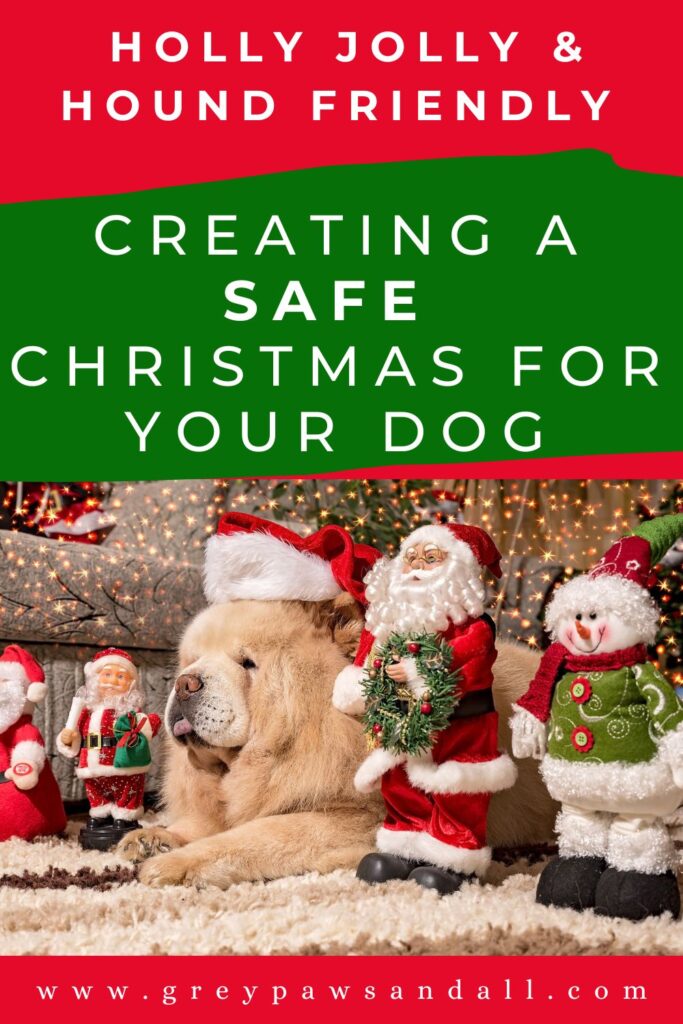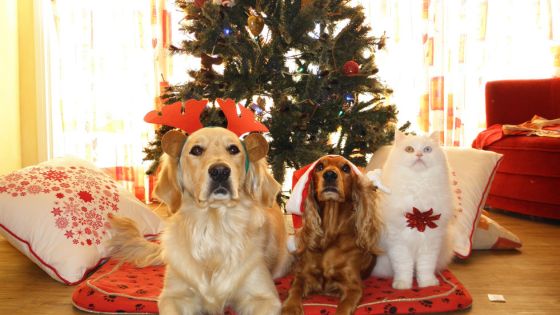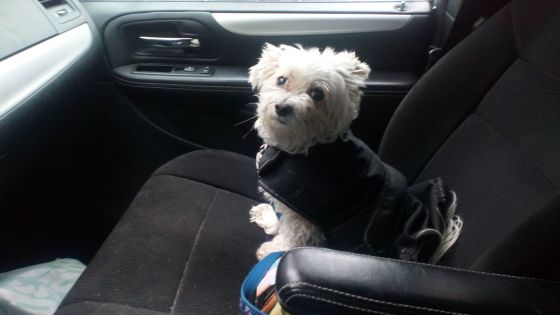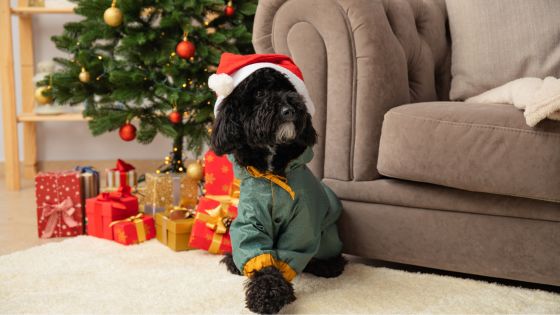Christmas is a time of joy, but it can also be risky for our furry friends. Imagine a playful pup, excited by the festive spirit, accidentally swallowing a shiny ornament. It’s a nightmare scenario that happens more often than you think.
During the holidays, hazards are everywhere, from decorations to food to guests coming and going. Since keeping our dogs safe is a priority, here is some actionable advice to make this holiday season safe and happy for everyone.
A Few Tips to Get Us Started
In order to make Christmas safe for our pets, we need to take a little extra care, so part of that time is not spent in the emergency room.
♦ When things get hectic, dogs’ needs can sometimes get neglected. It may be a holiday, but it’s never a holiday from the responsibilities of their care.
♦ Always make time to pay attention to your dog, and that includes not getting lax about walking him or her. If you worry there will be times you can’t give them your full attention, enlist the help of a trusted family member, neighbor or professional pet sitter/dog walker.
♦ With people in and out of the house, there’s an increased risk of your dog getting out. Warn everyone to take extra care, or keep the front door locked if you have to.
♦ If you don’t think you can safely monitor comings and goings, keep your dog separated in another part of the house – at least until everyone has arrived.
♦ Now is a good time to make sure ID tags are worn, and all contact information is current.
♦ Make a note of your vet’s holiday hours, the address of a 24 hour emergency hospital, and the number of the animal poison hotline. The last thing you want to do is search in a panic.
Note: Although I talk about dog safety throughout this article, most if not all of these tips can be applied to whatever pet you share your heart and home with.
Now That All That Has Been Said, Here are My Best Tips for Keeping Your Dog Safe this Christmas:
Trees and Plants
• Anchor your tree so there’s no risk of it falling on your dog.
• Fence it off, or sweep up tree needles regularly. They’re sharp and can get stuck in your pets’ paws, or cause internal damage if ingested.
• Although poinsettias have a low level of toxicity for cats and dogs, it is still best to keep them out of reach. Far more dangerous are mistletoe, lilies and holly. To be on the safe side, keep all flowers and plants out of reach.
• Tree water can contain fertilizers, bacteria, or even aspirin. A screen around the tree may be the easiest way to keep pets away from that particular water source.
• When you’re out, close the door to the room your tree is in.
Decorations
Dogs always seem to gravitate to the new things you bring into your home, don’t they? Imagine the temptation of trees, plants, decorations, bright colours and flashing lights.
• Keep ornaments above their reach as they, along with hooks and fasteners, can be eaten.
• Consider larger, unbreakable ornaments.
• Watch out for tinsel. The shine is a real attraction, and can be eaten or become wrapped around your dog’s neck.
• If your pet is freaked out by twinkling lights, buy ones that don’t.
• Snow globes can contain anti-freeze, which is deadly to pets. Pay attention to where you place them.
• Cords are a tangling hazard, and some dogs consider them a chew toy. Hide them, cover them, tape them down.
• Things like bubbling lights, fake spray snow and styrofoam are potential hazards.
• Who doesn’t love lit candles, and logs burning in the fireplace? Use fireplace screens, and keep candles out of reach. Never leave burning candles unattended, even if you think you will only be gone for a second. It never works out that way. Battery operated “faux” candles are an alternative, and some are quite beautiful. While they may not be an exact replacement for the real thing, you won’t have any of the real worry.

Food
Who isn’t guilty of slipping their dogs a little something from the dinner table? If you aren’t, great, but if we’re talking about you…
When you’re sitting around the table enjoying your feast with family and friends, it can be an exciting time for your dog. There are so many more people he or she can beg from! It also means a greater chance of stomach problems and vet visits.
• Even if you’re used to feeding table scraps, it’s probably best to put a blanket ban on that practice for now. Make sure you let your guests know not to feed your dog, and emphasize the importance of following the rule!
• Poultry bones can splinter once swallowed and cause damage, and food too rich for sensitive stomachs can lead to vomiting, diarrhea and even pancreatitis, which is potentially deadly.
• Never give sweets or chocolate. Remove all candy, even sealed boxes from their line of sight. We’ve all seen our pets accomplish amazing feats when they put their minds to it. Xylitol, used in sugar free treats is highly toxic, and grapes and raisins (yes, even 1!!) can lead to kidney failure.
• Don’t leave glasses with alcohol lying around for dogs to lick.
• Keep your garbage can in a cupboard, but if you prefer it out for the sake of convenience, make it pet proof.
Symptoms of food poisoning to look out for:
- Vomiting
- Diarrhea
- Lethargy
Christmas foods dogs can eat (still best to check with your vet first!)
- turkey meat (no skin or bones)
- salmon (fillets or cooked in spring water are preferable to smoked salmon)
- lamb meat (no bones)
- green beans
- Brussels sprouts
- parsnips
- carrot
- peas
- swede
- mash potato (best without added butter)
- new potatoes
- sweet potatoes
- cranberry sauce – must be unsweetened and with no added nuts.
Christmas foods dogs cannot eat
- chocolate
- raisins
- Christmas pudding and mince pies
- onions (and garlic, leeks, shallots and chives)
- alcohol
- macadamia nuts
- leftovers
- sweets/candy
- gravy
- stuffing
- pigs in blankets
Gifts and Wrapping
• Of course you want to include your dog in the holiday by giving them presents. Just buy ones suitable for them.
• Take care when the rest of the family are opening their gifts. Immediately throw out gift wrapping, ribbon, bows, and plastic packaging. They’ll be swiped before you know it.
• Don’t leave the kids’ toys lying around either. Small pieces can be bitten off, and cause choking or blockages.

Protecting Your Pup from Holiday Guests
Holiday gatherings involve many strangers, which can be stressful for dogs. It’s vital to have a plan in place to ensure they’re safe, calm and comfortable.
Constant supervision is crucial, so how about assigning a designated “Dog Watcher?” This would be a responsible adult willing to keep an eye on the dog, and provide you with peace of mind.
Noise, Stress and Anxiety
All the extra people in the house, means lots of extra noise. Kids running around, music playing, champagne bottles being opened, Christmas crackers and balloons. While some dogs have no problem and are more than happy to be in the middle of the mayhem, (that’s when the designated dog watcher comes in handy!!), others are more skittish and will feel quite nervous and stressed.
• Make sure they have a quiet place to relax. Put a bed, blanket, water and toys so they’ll feel comfortable, and make sure that area is warm enough.
• If your pet is particularly freaked out, there are natural remedies and traditional medications that may be helpful. Speak to your vet for some suggestions.
Walking in Holiday Crowds
Navigating through bustling crowds can be tricky. Some of the hazards include:
- Unpredictable movements by people, leading to injury.
- Dogs may become frightened from too much noise, which not only raises their anxiety but can also cause them to become a flight risk.
Keeping them safe:
- Always use a sturdy leash, and even if you’ve never used a harness before, now would be a good time to start.
- Stay vigilant to avoid any potential danger.
- If your dog uses a stroller, zip up the top for an added feeling of security, and don’t forget to secure the harness to the safety lead inside.
- Leave your dog at home.
Weather
Depending on where you live of course, Christmas can bring some nasty weather.
• Put your dog in a coat and/or a sweater, and consider limiting the amount of time he or she is outside.
• Salted sidewalks can burn your dogs’ paws, so try booties or a paw wax. Both worked well for my dogs while visiting Toronto in the winter.

Travel Safety for Canine Companions
Traveling can be hectic, but safety in the car is non-negotiable.
Whether it’s the law where you live (or are going), secure your dog in a crate, travel bag or use a seat belt attached to the harness.
I wrote an article about keeping your dog safe in the car, which you can read here.
Hotel Stays
When traveling, finding dog-friendly accommodations is essential.
• Research ahead for hotels, as this is a busy time of year and options may be limited.
• Be sure to read about their pet policies, as many hotels limit areas dogs are welcome.
Checklist of essential items for a dog’s hotel stay:
- Food and water bowls
- Food
- Medication
- Favorite toys
- Their bedding for comfort
First Aid and Emergency Preparedness
Being prepared for accidents is crucial, and that means having a pet first aid kit close to hand. Buy one online or make your own, just as long as you have one. If you’re going the DIY route, research what it should contain.
Here are some essential items:
- Gauze and bandages
- Non adhesive dressing
- Tweezers
- Tick remover
- Surgical tape
- Sterile gauze
- Cotton wool
- Blunt ended scissors
- Pet-friendly alcohol wipes or wound wash
- Blanket or towel
- Gloves
It’s also important to have contact information for your vet, nearby emergency hospital and poison control hotline.
Some of the signs of an emergency are:
- Difficulty breathing
- Persistent vomiting
- Seizures
Call your vet or after-hours emergency hospital right away.

Conclusion: A Safe and Merry Christmas for Your Dog
Keeping your dog safe during Christmas requires planning and awareness. From avoiding toxic decorations to managing stress, protecting your furry friends should be a top priority.
What do you do to keep your dog safe during the holidays? Sharing helps others so leave your very helpful advice below.
I help senior dog parents struggling with anticipatory grief and quality of life issues by offering practical tips, advice and one on one support.
I am also a Certified Pet Loss Specialist, helping you navigate through your pet loss journey.
Click this link to book a FREE 20 minute discovery call, visit my service pages (senior dog care or pet loss) to find out more or email me if you have any questions.
I’ve been rescuing and caring for senior dogs since 2009. From vision and hearing loss to obesity, dementia, kidney disease, liver issues, cardiac problems, Cushing’s, mobility challenges and more, you could say I’ve dealt with and learned a lot! In addition to my hands on experience, I’ve taken many courses and earned several qualifications to keep learning how to help senior dogs and they include: Senior Dog Enrichment, Understanding Canine Anxiety, Care of the Senior Pet and I’m a Certified Pet Loss Specialist.

Great guide to keeping your dog over the holidays! You’re right about crowds. I took Henry to a Christmas parade a couple of weeks ago. He did very well with the crowd. But there were so many folks walking about that I straddled him while we watched the parade and then carried him until the crowd thinned out a bit. He loves being carried and treated like the king he thinks he is anyhow, so it worked out well. This is a very complete and detailed guide. Well done! I’m sharing with my pet parents. Happy Holidays, Hindy!
Happy Holidays to you and Henry. Glad to hear he did well with so many people and so much noise. They do think they’re kings and queens don’t they? Perhaps we could all learn a thing or two about how to be treated!!
Great guide and information to keep your pet safe during Christmas and your life easier also, a must read and reminder for everyone. Happy Holidays to all of you with a woof from Nili
Things can get so hectic during the holidays, we could all use a gentle reminder.
Such excellent and important information for Christmas time and any time! Sometimes there are such hidden dangers folks don’t think about. Sharing this with my followers! Hope you all had a lovely Christmas and safely and happily enjoy this festive season!